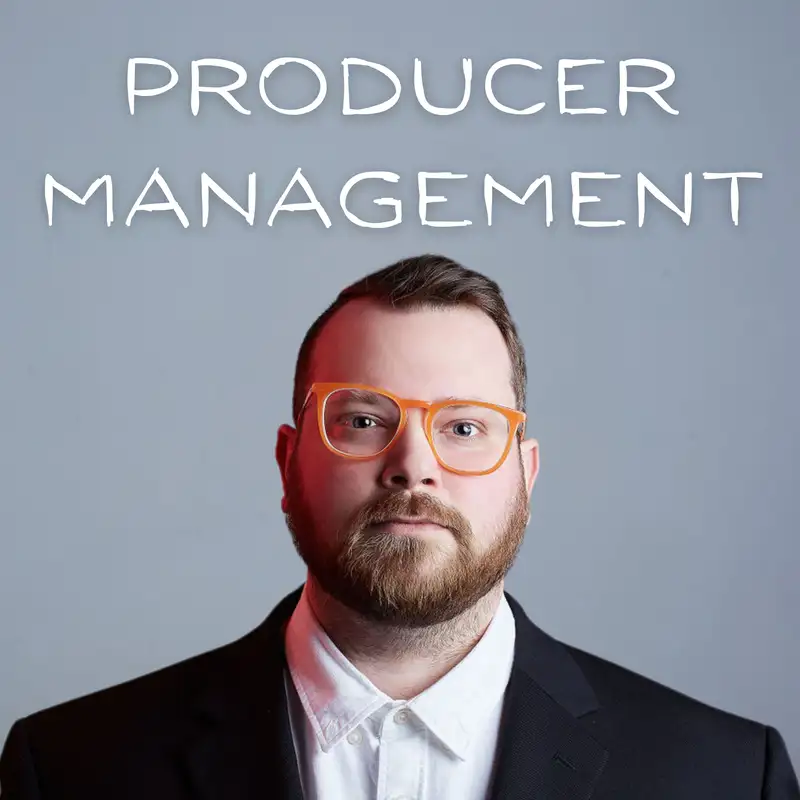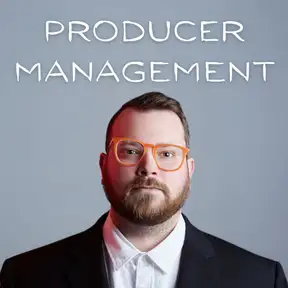
Why Established Producers Are Struggling
Newer producers typically assume that the established producers have all of the advantages. I've noticed established producers having deeper mental blocks around this career path. I've had the opportunity to see newer producers lap the more established producers and grow much faster.
Hey everyone, Daniel Grimmett here. You're listening to Producer Management, the podcast that lets you in on real conversations between professional music producers and their teams. The deals, the strategies, and the unfiltered advice.
This show is brought to you by my company, Dark Label Music. When producers want clarity, strategy, and growth, they call us. We're hired as a strategic partner, part management, part creative and business development, designed for the realities of being a music producer right now.
So whether you're a small studio or a Grammy-winning veteran, reach out to us at darklabelmusic.com to see if we can help. I've been helping producers build businesses since 2014, when I first started hiring producers to work at my production company. Typically, these were younger producers with solid work ethic and raw talent, but no clear direction for their career yet.
And I'd build them up from scratch, working on my team, and then they'd go off and have their own successful careers. I did that with three of them, and that's sort of what got me started in this. And around 2018, more established producers started reaching out and hiring me to consult and manage the business side of their careers.
And since then, I've gotten to work with hundreds of producers at all stages of their careers. By the end of this year, I think it'll be close to a thousand total, actually. And I say that all just to prove that I have a ton of data.
Talking to music producers is what I've spent the majority of my time doing for over a decade now. And just recently, like in the past year, I'm starting to notice a very interesting shift in the market. It used to be that the more established producers had an advantage, which would make sense, right? More experience, full-time income, maybe more credits.
And by established producers, I'm just referring to producers who are a little more settled into their careers. They're committed to doing this. They've been full-time for at least a handful of years, let's say.
For most of my career, it was typically easier to help the established producers grow because they had a foundation already. And it was a little bit harder to help the newer producers break into the business, which would make sense, right? But over the past year or so, that's been reversing. I'm really starting to see the old guard give way to the new guard.
I've had the opportunity to see newer producers actually start to lap the more established producers and get results and grow much faster. And what's funny is that newer producers typically assume that the established producers have all of the advantages because they got their start earlier and they have just more to show for their career. But that's not always true.
I mean, some do, yes, but I've noticed established producers having more and deeper mental blocks around this career path that are just dramatically slowing them down as the next generation of working producers kind of catches up. And I don't know exactly why, but I've been trying to look more into it. My hunch is that the newer producers maybe just understand the game or the world that they're getting into in this modern era and they're okay with that.
While the more established producers are not adapting nor taking these changes well, and they're afraid to lose what they have, which I totally understand. That makes sense, right? Like this has always happened, but I don't know. There's just something in the past year just gotten a bit more extreme, I guess, like much more noticeable.
I don't know if it's AI or if this career just requires different things from producers than it used to, but I've just been meeting more and more established producers who just seem, to be honest, really half committed to this career long-term. And they definitely wouldn't say that out loud or even believe that probably, but actions speak louder than words, right? And when I'm advising producers and helping them grow, I have to look at what they do and how they act, not necessarily at what they say. Not that that isn't important, it is, but you really learn the truth from the former.
So in this episode, I just want to break down four different mindsets that I see are keeping established producers kind of stuck right now and unable to adapt while the new generation of producers is speeding ahead. Actually, which is, on one hand, good thing, right? Like I have hope for the future, so that's good. But we're trying to help everybody here.
This episode isn't to cast any judgments on anyone, like at all. I'm really just making this episode for two reasons. The first reason is, of course, for the established producers.
We work with a lot of them and I just want them to become more self-aware of these blind spots so they can make the decision of whether or not they want to address them. I hope they do, but that is their choice, of course. The second reason is to obviously help prepare the newer producers for just some of the challenges that they're going to face in the future.
Because if you build the career that you want as a producer, you're starting now, then at some point you will become one of these established producers that I'm speaking to and you'll have the same hurdles. It will affect you too. It just might be, you know, three to five to eight years from now.
So here's the first one. Established producers, more often than the newer producers, they tend to think that their situation is unique when it comes to solving their business problems. And they may have some interesting circumstances because they've been doing it for a while or they're, you know, stuck in a weird project right now or something and that's fine.
But they think that just because they've been doing this for a while, that it's going to take some fancy business strategy to fix their problem. But usually it doesn't. They're missing the same business fundamentals that newer producers are missing.
They're really starting at the same place on the business side. However, there's a big difference. The problem for the established producers is that their ego gets in the way of them thinking that, right? Like they think they're above the basics and they may not say this.
They're not being arrogant about it. Again, I'm just saying it's how they act, right? It's how they actually function and behave. They function and behave as if their situation is above the basics and that first principles couldn't possibly solve their problem.
It's just much too complex. So they search for the perfect solution that makes them feel special, which dramatically slows them down. And even though they've been full time for a while, the truth is most of them were never good at business.
And I don't say that to be mean. When we came up, my generation, we weren't taught that. It wasn't really a requirement.
No one talked about it. So I don't blame anybody, but that's the truth. They were just never really good at business.
They got their work because they're talented, of course, and they had a good network and all their work came from that network. And now that over time, the network may not bring in enough work to support their lifestyle as they get older, they think they need some fancy solution. The reality is they just don't know how to get work.
They never did. They never learned it. They never had to in the past and they must humble themselves enough to learn and implement the basics.
And that's very easy to say, but it's actually pretty hard to do. That's what adapting looks like, becoming a beginner again in order to master the skills required of the current market. This applies to any industry.
And you have to kind of do this over and over again. But being a beginner sucks because if you're an established producer, it's been a while since you were new at something and being new at something is kind of frustrating. But this is why newer producers starting right now actually have an advantage because this is the first time they're learning something.
So they just do the work without having to sit around and ruminate about everything. Newer producers are coming into this world, I think, just again, understanding that being business savvy is required and they're fine with that. It doesn't make them less of a creative, like they just sort of get it.
They don't have to be convinced. So that's the first one. The second mindset I'm seeing with established producers is this.
They don't think that anything in this career is controllable. Quick lesson for context. There are two sides to your business as a producer.
We'll just say the risk bucket and the control bucket. Risk doesn't mean bad. The risk bucket is just your speculative work, right? Like placements or sync where you're going to make a lot of songs and you may or may not make any money from them.
The control bucket is the business models that you control, like your personal brand or your ability to acquire freelance work. You may create a product or something, whatever it is. And that's the work that generally pays up front.
And again, you control it. One isn't better than the other. They're both important and they should serve each other ideally.
However, most established producers have spent the majority of their time in the risk bucket. That's how they were raised. You get into rooms, you make a bunch of songs and hope to land a placement or a record with an artist.
If you're lucky, you do that enough to where a publishing company is interested enough to sign a pub deal and you get a little advance and then you can keep the bills paid while you go out and repeat the cycle. But the problem is that they take the same mentality and apply it to their freelance business or other parts of this industry. They just can't really wrap their heads around the fact that freelancing specifically, this doesn't apply to the industry side, but freelancing specifically is really just a math problem.
You need X amount of clients, then there are controllable activities that you can do to land those clients. It's the same, whether we're talking about music production or a landscaping company, it's really the same math. But many times established producers are understandably so indoctrinated into thinking that making money as a producer is this giant mystery.
Because when we grew up and came up in this business, there were still a lot of this like glitz and glamour and mystery and all that kind of stuff. So they're modeling old mindsets. And unfortunately, those mindsets have been passed down from generation to generation.
And they look up to people and look up to their heroes because those people are very talented and 100 percent worth looking up to them because of their talent. But they adopt, unfortunately, their bad business mindsets. Luckily, the new generation, I would say, is certainly waking up to this more.
They're a bit more savvy, I think, to the smoke and mirrors of the music industry because they just have access to more information. They can kind of see things for how it really is. So that's number two.
The next thing I'm noticing is that established producers have just lost a lot of their boldness and they misdirect their risk. And I'll explain what I mean. For example, they will risk their entire lives and their health and their retirement chasing that big hit.
And that's okay. I'm not dogging that or anything. But if you ask them to invest a few grand into the control side of their business, they act like that's the most risky thing they could do in their life.
It's kind of interesting. They hoard the little bit of money they have because deep down, they really aren't sure that they'll ever make any more money. They may not say that, but again, that's how they act.
And even if you prove to them that they can, it's real tough to get them to believe that. And I completely understand having a financial cushion and a savings account and all of that, but sometimes we have to deploy that capital in order to grow. That's what business is, right? So if you don't do that, then the thing that you're most scared of happening will actually happen.
You will eventually run out of money and then have to tap into your savings account. So you're just slowing down the pain, but you're not actually solving it. This is like a classic business mindset.
I remember I used to work for a local advertising companies, one of my first real jobs, probably back in like 2007. And I noticed that when small businesses were hurting financially, they would stop marketing, they would stop spending money on marketing. And I remember thinking how crazy that was, even being a young person, I was like, that just doesn't make sense.
I couldn't wrap my head around it. Like hoarding your money doesn't get you new customers. And the lack of customers is why you're in this position in the first place.
And then they stopped spending money on the thing that's getting them customers. I just, I don't know. It didn't make sense to me, but it was a very valuable lesson for me to see as a young, whatever, 19 year old.
And I think it helped shape how I run businesses in the music industry, even back when I was just, you know, an engineer working in studios, running a freelance business. I got to learn during that time that most people that have a business are not actually that good at it. And their entire life is run by fear.
I also learned that this was a choice that they made for themselves. I'm not saying it was easy, but it was technically a choice because there were other local businesses that despite economic hard times, remember this was during like the housing crisis, right? These businesses still kept growing their business and they're still around today. So I would encourage any established producer to operate with a blend of boldness and logic.
If fear is dominating all of your career and business decisions, then you may need to reflect on whether or not you truly believe in what you're capable of. And it's okay if you don't right now, deep down, and you know, that can be fixed. And I don't just mean your skills and talent.
Producers just kind of lean all in on that. We know you're great at producing. That's not what I'm talking about here.
I mean, truly believing in who you are and what you're doing. And the final thing is this, I've mentioned it a few times in my content before, the producers that tend to get replaced by the next generation are ones that just can't get over how things used to be. They really over-romanticize the past and they want the industry to work how they want it to work, not necessarily how it actually works.
And again, it's just a little bit of an ego thing, a little bit of, you know, liking how things used to be, which I totally get it, but it's sort of like reminds me of the high school football star that just can't get over it. Right. And he revels about the glory years and it's really just his identity for the rest of his life.
Then there are the people who look at the past and say, you know, Hey, that was great. I learned a lot. And now I will apply that to where things are at in life.
Now, most producers are the high school football star. And that's because nostalgia is very strong when things change and we feel threatened or left behind or irrelevant, or maybe just kind of bummed about how things are. Now we wish they were like they used to be.
Then fear kind of kicks in. Right. And sometimes people react to that fear by doubling down, but they just end up hurting themselves.
Doesn't end up hurting anyone else, but themselves. What I try to do for myself is just say, okay, what can I apply from five years ago? Even if it's not that relevant to what I'm doing today, that will give me an advantage in this current moment, because time in the game and experience and all that stuff is super important. I'm not discrediting that at all from the, you know, established producers.
You actually do have a lot of really great advantages, but a lot of times they're just either not applied or applied the wrong way. I could do an entire episode on that because I understand that careers don't just randomly last forever. And I know this to be fact, because I'm in a unique position that allows me to see behind the curtain more than most people probably see.
And a lot of producers who have been around for a while are kind of getting pushed out of the game or just straight up quitting. And they're not sharing it on social media. Obviously it's happening quietly.
I don't say that to scare anyone. And again, no judgment. If you relate to anything that I said today, I'm not special.
I've dealt with all of this myself, which is why I can even talk about it. I just want to make the established producers aware and potentially reveal some blind spots. And I want to give the newer producers an advantage by just knowing what to prepare for in the future.
Hope that helps. That's the episode. If you go to producermanagement.com, you'll find links to jump on our newsletter, which I highly recommend because it's the perfect companion to the show.
And if you enjoy what we're doing here, please leave us a five-star review or share it with a friend. Thanks for listening. That's the episode.


